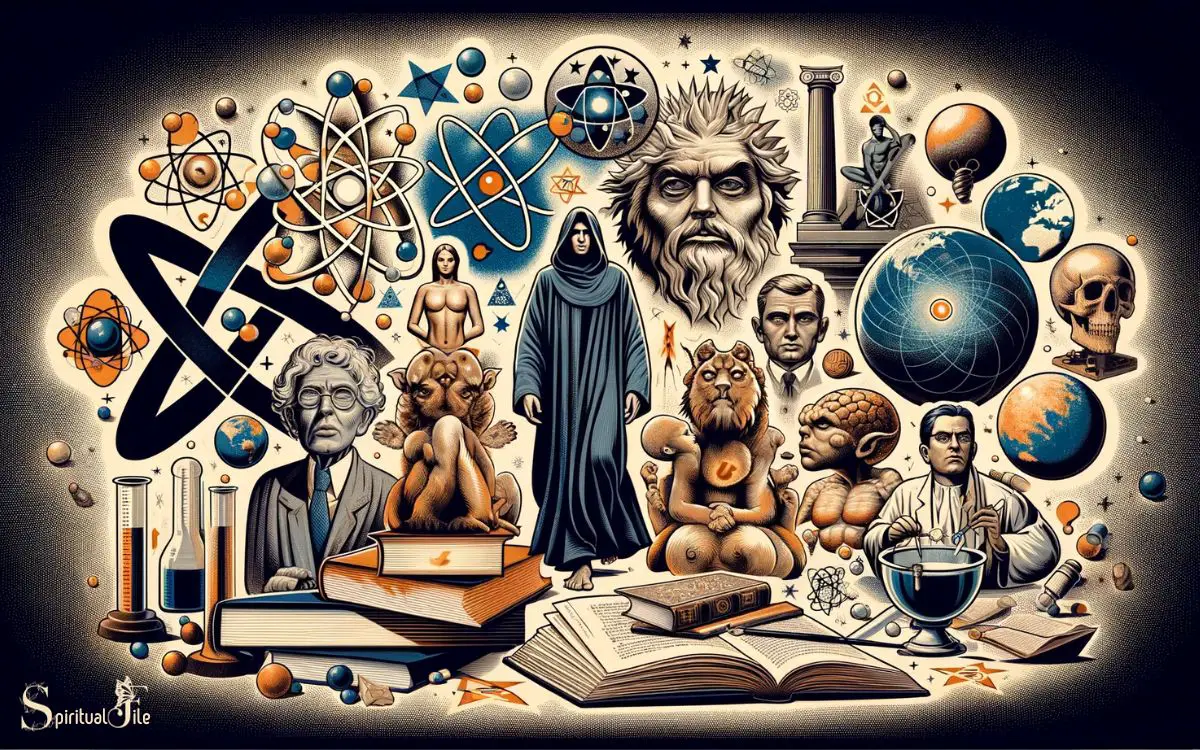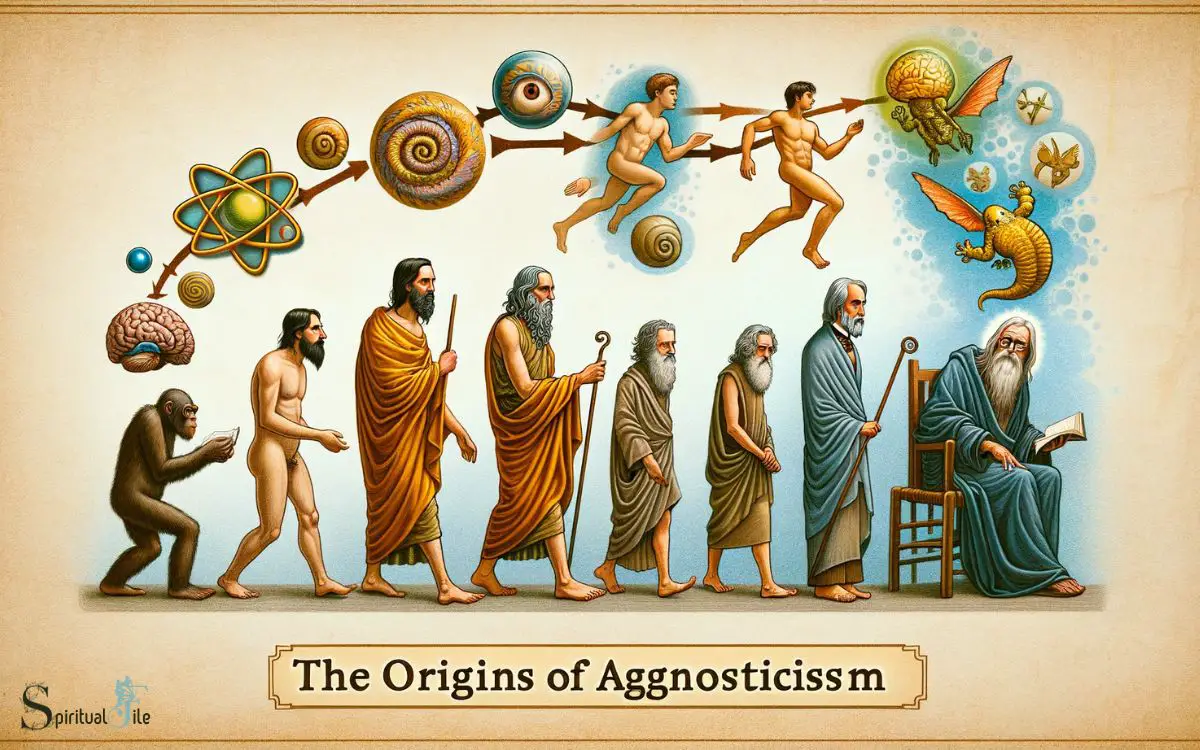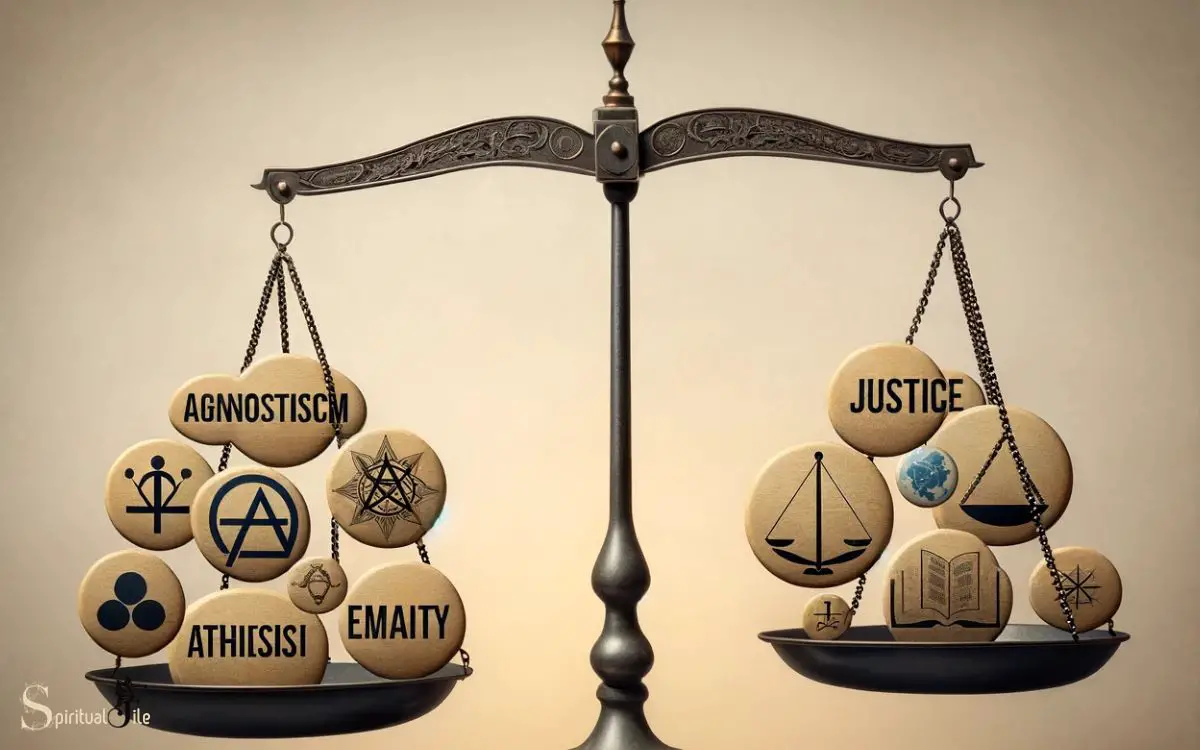Agnostic Vs Atheist Vs Spiritual: Unique Lens!
Agnosticism, atheism, and spirituality are three distinct philosophical perspectives that address belief in the divine or the supernatural.
Agnosticism is the view that the existence or non-existence of any deity is unknown and possibly unknowable. Agnostics maintain that divine realities are not definitively provable. An agnostic might say, ‘I don’t have enough evidence to know whether God exists or not.’
Atheism, on the other hand, is the absence of belief in the existence of deities. Atheists do not believe in the existence of gods. An atheist may assert, ‘I believe that gods do not exist.’
Spirituality, on the other hand, involves a personal belief or experience related to a sense of connection to something bigger than oneself, which can but doesn’t have to include belief in a deity. A spiritual person might meditate daily to feel a connection with the universe.
Each belief system—agnosticism, atheism, and spirituality—offers a unique lens through which individuals view the world and their place within it, reflecting a rich tapestry of personal conviction and existential contemplation.

Key Takeaway
8 Aspects: Agnostic Vs Atheist Vs Spiritual
| Aspect | Agnosticism | Atheism | Spirituality |
|---|---|---|---|
| Belief in God or Deities | Uncertain about the existence of God or deities. | Rejection of belief in God or deities. | Belief in the existence of a higher power, but often not tied to traditional religions or deities. |
| Certainty | Uncertainty about the existence of God. | Strong certainty in the absence of God. | A range of beliefs, from certainty in the existence of a higher power to uncertainty or ambiguity. |
| Rejection of Religion | May or may not reject organized religions. | Often rejects organized religions. | May or may not adhere to organized religions, often seeking a personal, non-traditional path. |
| Spirituality | May or may not embrace spirituality as a concept. | Generally secular, with no spiritual belief. | Often embraces spirituality as a personal and meaningful aspect of life. |
| Afterlife Beliefs | Uncertain about an afterlife, if any. | Typically do not believe in an afterlife. | Belief in an afterlife varies and can include reincarnation, energy continuation, or other concepts. |
| Belief in the Supernatural | Open to the possibility but not committed. | Typically reject belief in the supernatural. | May believe in the supernatural, including spirits, energy, or other non-material forces. |
| Rituals and Practices | May or may not engage in spiritual practices. | Typically secular, with no religious rituals. | May engage in various spiritual practices, meditation, or personal rituals. |
| Community Involvement | May or may not participate in religious communities. | Often not affiliated with religious communities. | May engage in spiritual communities or groups. |
Understanding Agnosticism

In considering the topic of ‘Understanding Agnosticism’, it is essential to grasp the philosophical stance of agnosticism as a position that asserts the inability to know whether a higher power or ultimate reality exists.
Unlike atheism, which denies the existence of any deity, agnosticism takes a more nuanced approach, acknowledging the limitations of human understanding.
Agnostics neither affirm nor deny the existence of a higher power, choosing instead to embrace uncertainty.
This philosophical position prompts individuals to question and explore their beliefs, encouraging open-mindedness and critical thinking.
It is important to note that agnosticism is not synonymous with indecision or apathy but rather a deliberate acknowledgment of the complexities inherent in the pursuit of ultimate truths.
Embracing agnosticism involves a commitment to intellectual humility and a willingness to engage in ongoing philosophical inquiry.
The Tenets of Atheism

The philosophy of atheism centers on the rejection of theism and the assertion of a naturalistic worldview. Atheism is not a monolithic belief system, but there are certain common tenets that many atheists hold.
These include:
- Rejection of the existence of deities or supernatural beings based on lack of empirical evidence.
- Emphasis on critical thinking, reason, and evidence-based beliefs.
- Advocacy for secularism and the separation of religion from government and public policy.
- Promotion of ethical and moral behavior based on humanistic principles rather than divine commandments.
Atheism, as a worldview, is characterized by a focus on rationality, skepticism, and the natural world, and it often intersects with humanism and secularism in advocating for a more rational, evidence-based society.
Exploring Spiritual Beliefs

Exploring spiritual beliefs involves an examination of the metaphysical and transcendent aspects of human existence, often encompassing a search for meaning, purpose, and connection beyond the material world.
People may approach spirituality in various ways, each with its own unique characteristics and practices.
Below is a comparison of different spiritual beliefs:
| Spiritual Belief | Key Features |
|---|---|
| Christianity | Belief in Jesus Christ as the savior and the Trinity of God. Practices include prayer, attending church, and reading the Bible. |
| Buddhism | Focus on personal spiritual development, meditation, and the Four Noble Truths. Rejects the notion of a personal god. |
| Hinduism | Embraces the concepts of karma, dharma, and reincarnation. Involves rituals, meditation, and devotion to deities. |
| Paganism | Diverse beliefs often centered around nature, multiple deities, and rituals honoring the earth and seasons. |
Understanding these various spiritual beliefs can foster greater empathy and respect for different perspectives on the transcendent.
Origins of Agnosticism

Origins of Agnosticism can be traced back to the 19th century when the term was coined by Thomas Henry Huxley to describe the philosophical position that the existence of a higher power or ultimate reality is unknown and perhaps unknowable.
Key Points about the Origins of Agnosticism:
Huxley’s Coined Term: Thomas Henry Huxley, an English biologist and anthropologist, introduced the term ‘agnosticism’ in the 1860s to represent a stance of skepticism towards the existence of a deity.
Influence of Scientific Advancements: The rise of scientific inquiry and the theory of evolution during the 19th century contributed to the development of agnosticism as a philosophical position.
Emphasis on Empirical Evidence: Agnosticism emphasizes the importance of empirical evidence and critical thinking in understanding the nature of existence.
Intellectual and Moral Autonomy: Agnosticism promotes the idea of intellectual and moral autonomy, encouraging individuals to question and explore their beliefs.
Perspectives on Atheism

A comprehensive understanding of atheism requires an examination of its diverse perspectives and philosophical underpinnings.
Atheism encompasses a range of beliefs, from strong atheism, which asserts the non-existence of gods, to weak atheism, which simply lacks belief in gods. Here are some common perspectives on atheism:
| Perspective | Description |
|---|---|
| Strong Atheism | Affirms the non-existence of gods. |
| Weak Atheism | Lacks belief in gods without necessarily asserting their non-existence. |
| Secular Humanism | Emphasizes reason, ethics, and justice without supernatural beliefs. |
| Agnostic Atheism | Claims uncertainty about the existence of gods, but lives as if they do not exist. |
Understanding these perspectives can provide insight into the varied philosophical foundations of atheism. This comprehension sets the stage for exploring the role of spiritual practices and rituals in the lives of atheists.
Spiritual Practices and Rituals

The practice of personalized spiritual rituals and the incorporation of mindfulness into daily life are key components of the discussion on spiritual practices and rituals.
These practices can vary widely among individuals and can include activities such as meditation, prayer, or engaging in acts of service.
Understanding the role of these practices in fostering a sense of spirituality and connection to something greater can provide valuable insights into the diverse ways individuals approach their spiritual beliefs.
Personalized Spiritual Rituals
Personalized spiritual rituals can greatly enhance one’s spiritual practices and provide a sense of meaningful connection. When tailored to individual beliefs and values, these rituals can deepen one’s spiritual experience and foster a greater sense of inner peace and fulfillment.
Here are four key elements to consider when developing personalized spiritual rituals:
Personal Reflection: Take time to introspect and identify the values, beliefs, and practices that resonate with your spiritual journey.
Symbolism and Meaning: Incorporate symbols, objects, or actions that hold personal significance and embody the essence of your spiritual connection.
Mindfulness and Presence: Engage in rituals with full awareness and presence, allowing yourself to be fully immersed in the experience.
Flexibility and Adaptability: Be open to adjusting and evolving your rituals as your spiritual path unfolds, ensuring they remain relevant and enriching.
Mindfulness in Daily Life
Engage in mindfulness practices to cultivate a deeper spiritual connection and enhance daily living.
Mindfulness involves being fully present in the moment, acknowledging thoughts and feelings without judgment. It can be as simple as focusing on your breath, observing nature, or practicing gratitude.
By incorporating mindfulness into daily life, individuals can experience a heightened sense of awareness, appreciation for the world around them, and a greater connection to their inner selves.
This practice can lead to reduced stress, improved mental clarity, and a more profound understanding of one’s place in the universe.
Whether through meditation, yoga, or mindful walking, these practices offer a way to infuse spiritual principles into everyday routines, promoting a sense of peace and fulfillment.
How Does Being a Spiritual Christian Differ from Being Agnostic or Atheist?
Being a carnal vs spiritual Christian differs from being agnostic or atheist in the sense that a carnal vs spiritual Christian believes in a higher power and strives to live a life guided by faith and spiritual principles, while agnostics and atheists do not ascribe to any form of religious belief or faith.
Agnosticism, Atheism, and Morality

When considering agnosticism, atheism, and morality, it is important to understand the varying perspectives on ethical principles and values within these belief systems.
Ethical Framework: Both agnostics and atheists can derive their ethical framework from various sources such as humanism, utilitarianism, or social contract theory.
Personal Responsibility: Agnostics and atheists often emphasize personal responsibility and the impact of one’s actions on others, rather than relying on divine judgment or reward.
Community Values: Morality for agnostics and atheists can be shaped by community values, secular laws, and a desire for social harmony and justice.
Empathy and Compassion: While the source of morality may differ, agnostics and atheists often prioritize empathy, compassion, and the well-being of others in their ethical considerations.
Understanding the moral perspectives within agnosticism and atheism can lead to meaningful discussions and greater mutual understanding.
Conclusion
The three belief systems of agnosticism, atheism, and spirituality offer diverse perspectives on the existence of a higher power and the meaning of life. Each belief system has its own set of principles and practices, influencing the moral compass of its followers.
Whether one chooses to embrace uncertainty, deny the existence of a deity, or seek a deeper spiritual connection, these diverse beliefs contribute to the rich tapestry of human experience.






